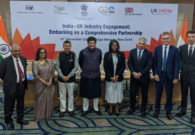Building momentum towards a UK-India FTA
Since the UK voted to leave the EU in June 2016 there have been calls for a UK-India FTA in both countries. This is a recurring theme in discussions with the media in India and, indeed, Minister Goyal said on 11 July that India is open to an FTA with the UK.
I think an FTA is absolutely the right ambition, and I would encourage the UK and Indian Governments to set-out, in the near future, a roadmap to such an Agreement. This would excite businesses and help them to plan their expansion strategies.
While there is a clear need for the Indian and UK Governments to be more ambitious for the relationship, I would argue that the immediate priority should be removing market access barriers and improving the ease of doing business.
I’m drawn to this approach because a successful journey to an FTA will need to build momentum – it is imperative that both governments deliver incremental market access reforms across an initially limited, but growing, range of priority sectors. Sectors where there is scope for win-win outcomes. As well as building momentum, this will build confidence that the journey can be a successful one.
The existing Joint Trade Review (JTR) and Joint Economic and Trade Committee (JETCO) provide the right mechanism to secure reforms that make it easier for businesses to buy, sell, invest and partner in both markets.
The virtual JETCO Ministerial happening next week, led by Ministers Piyush Goyal and Liz Truss, is therefore a timely opportunity for a roadmap to be announced and for early progress to be made on market access reform.
Three business-led working groups, covering food and drink, healthcare, and digital services, are presenting a series of recommendations to the Ministers that, if adopted, will lead to greater bilateral trade and investment. This is an immediate opportunity for both governments to build momentum towards a trade deal by accepting and implementing these recommendations.
Alongside this, I think the bilateral is an opportunity for Indian Ministers to reassure UK businesses that Mr Modi’s goal of a “self-reliant India” will in no way impede UK trade and investment with India; to reassure partners in the UK that India is not heading in a protectionist direction.
Beyond the immediate JETCO activity and the need for an FTA roadmap, I think the profile of the bilateral UK-India G2G engagements could be greatly enhanced. It may be as simple as improving the packaging.
There is the UK-India CEO Forum (which reports to the Prime Ministers), the JTR, JETCO, the Economic and Financial Dialogue, plus other dialogues focussing on subjects like legal services. There is an extensive Ease of Doing Business programme and, of course, there is the UK-India Tech Partnership launched when Mr Modi was in London in April 2018.
All these elements are valuable. They deepen the bilateral relationship and deliver for businesses. But if we could more tightly align them, as part of a UK-India Strategic Trade, Investment and Economic Dialogue, it would make these elements greater than the sum of their parts.
Such an approach would signal to the world that the UK and India recognise the importance of the bilateral relationship. It would increase the visibility of the UK in India, and of India in the UK, thus stimulating trade and investment flows. And, vitally, this approach would enable both governments to secure market access reforms for businesses on an ongoing and expanding basis.
So, let’s see a roadmap towards a UK-India FTA. A roadmap that tackles market access and ease of doing business obstacles en route. And let’s elevate the profile of the bilateral relationship, not by creating a new forum, but by tightly aligning the existing dialogues.
This is an approach that businesses would endorse, and which businesses would actively engage with to support.

 By Kevin McCole
By Kevin McCole 





